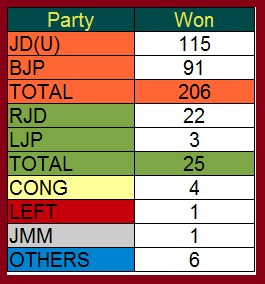The man of few words has written a new chapter in the history of Bihar. Bihar has chosen development over affiliations of caste. Nitish Kumar has come back as the Chief Minister of Bihar for the second consecutive term, in a landslide victory, beyond everybody’s expectation.
The verdict marks a new beginning for Bihar. Political analyst, Yogendra Yadav describes it as a vote for aas (hope) more than vikas (development). Nitish will try his best to build on the work done in the past five years. This means more development, more progress.
The potent mix of development and shrewd politics has brought Nitish Kumar another five-year stint in Bihar. Reservation for women in civic bodies, social benefits like school uniforms and bicycles for school-going girls; and empowerment at the local level through self-help groups (SHGs) ensured that the women of Bihar voted him in.
Nitish’s 30-member ministry was sworn-in by Governor Devanand Konwar at Gandhi Maidan on the 26th of this month. Among the ministers, 11 are from upper castes, nine from backward castes and four each from Extreme Backward Castes and Schedule Castes; and two are Muslims. The composition of the ministry reflects his reach across sections in Bihar. His strategy of not pleasing any particular community and to carving out new communities like the Mahadalits, has paid off. He seems to have rewarded them all for the same while forming his ministry.
 The results also show that the Congress’s cry over Nitish allying with BJP, the party with a Hindutva agenda, went unheeded, as it failed to impress the Muslims in the state. Even in constituencies with as many as 75% Muslim voters, the JD(U) was preferred over the Congress.
The results also show that the Congress’s cry over Nitish allying with BJP, the party with a Hindutva agenda, went unheeded, as it failed to impress the Muslims in the state. Even in constituencies with as many as 75% Muslim voters, the JD(U) was preferred over the Congress.With Nitish winning 115 seats, a gain of 27 seats from the last assembly polls in 2005, his rivals have been taken aback with the sheer magnitude of the victory. The BJP has gained 36 seats in this election taking its total to a formidable 91. The verdict could not have come at a better time for the saffron party. With allies like the Trinamool Congress, the Telugu Desam Party and Biju Janata Dal, deserting it over its lack of development agenda and communal politics, the Bihar results have given a much needed breather to the BJP. It also presents an opportunity for the party to ally with new partners for the next Lok Sabha polls.
The opposition, which was banking on the anti-incumbency vote, has been routed. The results have snubbed Lalu, whose Rashtriya Janta Dal (RJD) managed to win just 22 seats, a loss of 32 seats from the 2005 polls. Adding insult to injury was the fact that his wife and former Chief Minister, Rabri Devi lost in both Raghopur and Sonepur.
The biggest loser, however, is Congress, which has been reduced to nothing in Bihar, with just 4 seats to boast of. This is a huge loss of face for the Congress and holds long term implications for the upcoming UP elections in the later half of 2011 and the Lok Sabha elections of 2014. Bihar experience has also made it imperative for it to rethink its call for a “respectable alliance” in Bengal.
Mayawati has also learnt her lessons in this poll. Her failure to sell the “UP model of development” in Bihar will have a substantial bearing on the campaign strategy for elections on her homeground next year.
His phenomenal victory makes Nitish Kumar a formidable contender for the leadership of the NDA in the next Lok Sabha elections. He will now have to prove his voters’ choice correct and make full use of the opportunity given to him to sustain these prospects. As he says, “We have been among the people. This means a lot still needs to be done. The work must go on.”
